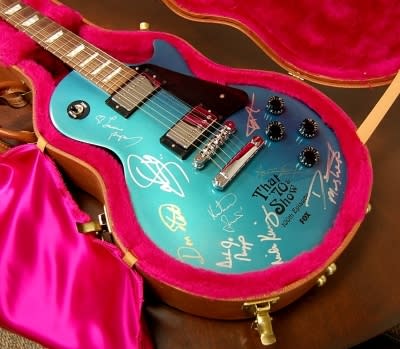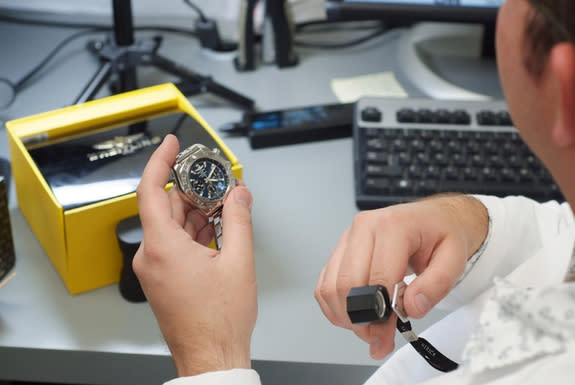World's Second-Oldest Profession Goes Online
Todd Hill took a 3,000-year-old offline business and brought it into the digital age. Hill, a 25-year veteran of the pawn industry, made the leap from running a 30-store brick-and-mortar operation in Colorado and Utah to the online world in 2009 when he founded Pawngo.com, the first full-service online pawn shop in the U.S. To date, Pawngo has loaned more than $7 million dollars in 50 states.
With roots that can be traced back to ancient China, pawnbroking — often called the world's second-oldest profession — had largely been a cottage industry of neighborhood stores serving as lenders-of-last-resort until Hill leapfrogged tradition and brought the business into modern times. By going online, he also neatly sidestepped consumer resistance to the stigma of physically visiting a pawnbroker by making it possible for customers to make their transactions in private outside of potentially embarrassing public scrutiny.
"It definitely feels much more like the everyday things we do online," Hill told BusinessNewsDaily.
[Would you buy George Clooney's sweater? Or Elvis' shoes?]
Pawnbrokers offer short-term loans based on the value of personal items such as jewelry that customers pledge as collateral. At the end of the loan term, the customer can retrieve his or her property by paying off the loan principal plus interest. If the loan is not paid off, the pawnbroker assumes ownership of the pawned items and is free to resell the pledged property.
That's essentially how Pawngo.com operates, but with a different logistical architecture. Instead of bringing their items to a physical location for evaluation, customers answer a few questions online about the items they want to pawn or sell outright. Pawngo will respond with an estimated offer in an email.
Offers are made up to 75 percent of an item's value. If the customer wishes to accept Pawngo's offer, he prints out a FedEx label from the Pawngo website and ships the item at Pawngo's expense.
When the item arrives, Hill said, a team of certified evaluators inspects the item and prepares a final offer. Once the offer is accepted, the funds are immediately transferred into the customer's bank account and the item is stored in the pawnbroker's secure fulfillment center under 24-hour video surveillance.
When the loan is settled, Hill said, the item is shipped fully insured back to the customer at Pawngo's expense.
Hill has also staked out the high end of the pawn market, dealing primarily with luxury goods such as jewelry and diamonds, luxury watches, precious metals, designer handbags, cameras, Apple products, musical instruments and collectibles and certified art.
What they won't accept, he said, are TVs, video game systems, firearms, car audio equipment and point-and-shoot cameras — the kinds of stuff that are the stock-in-trade for many pawnbrokers.
"Our business deals with high-end luxury assets," Hill said. "Banks don't loan on these types of assets."
The typical customer, he said, is a female in her early 40s. Half of the customers are individuals and half are small businesses.
The largest loan that Pawngo has extended is $100,000 for an 11-carat diamond ring valued at $250,000 to $300,000, Hill said. He's also accepted some less conventional items, such as a 1980 bottle of Dom Perignon champagne valued at $800 and an 85-pound bar of silver. Pawngo also bought outright from a customer a Gibson Les Paul 2001 Teal guitar signed by the cast members of "That '70s Show" for $1,871.78.
The average pawnbroker loan is $150 for 30 days, according to the National Pawnbroker's Association. The typical loan Pawngo makes is for $3,000 for a period of four months, Hill said. The operation offers loans for up to six months at an interest rate of 3 to 6 percent. While there are no principal payments over the span of the loan, the interest is debited directly from the customer's bank account monthly.
The average interest rate of local pawn shops is 15 percent and goes up to 25 percent in many cities, according to Pawngo, which makes Hill's operation less expensive for the consumer. Pawngo plans to make up the difference in margin with volume as the online operation scales.
"Our margin is much less than it is for brick-and-mortar operations," Hill said. "But we're able to scale nationally."
Pawngo's redemption rate of 85 percent mirrors the national average. The company wholesale's 95 percent of items not redeemed using outlets such as eBay and Amazon Marketplace.
Pawngo currently operates with 30 employees, but plans to increase headcount to 125 to 150 by 2014 as the business scales nationally. Pawngo is venture-backed by Daylight Partners, Access Venture Partners and Lightbank, the $100 million fund started by the founders of Groupon.
"We're able to develop the culture we want and the people we want to hire," Hill said.
One of the attractive aspects of pawnbroker loans for many consumers is that no credit check is required and the transactions do not affect customers' credit reports. They also offer an alternative source of financing for people who have no banking relationship or would not qualify for traditional loans.
"The service we offer is something that banks can't fulfill even in good times," Hill said.
This story was provided by BusinessNewsDaily, a sister site to LiveScience. Reach BusinessNewsDaily senior writer Ned Smith at nsmith@techmedianetwork.com. Follow him on Twitter @nedbsmith.
Copyright 2012 LiveScience, a TechMediaNetwork company. All rights reserved. This material may not be published, broadcast, rewritten or redistributed.



